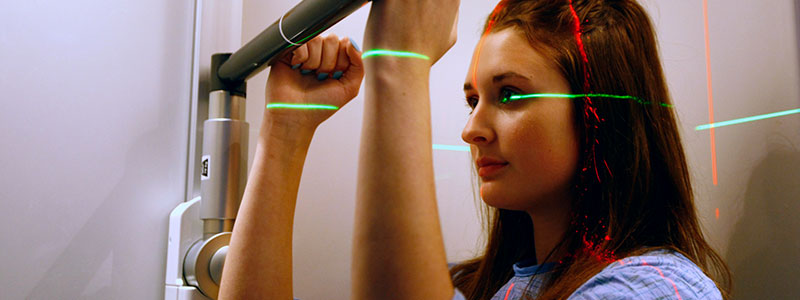Bone DEXA and EOS scans

Bone health is extremely important, especially in growing children. For some children, certain illnesses, developmental issues or medical treatments may interfere with bone health. Bone scans allow us to view and evaluate your child's skeletal system.
The diagnostic imaging department offers bone scans using DEXA imaging to measure bone density, or EOS X-ray imaging to view bone joints and the musculoskeletal system.
DEXA scans
What is a DEXA scan?
Cook Children's radiology team provides testing, evaluations, and diagnoses for children and teens who may have, or be at risk for, low bone density. These test results can help you and your pediatrician determine the best course of care for your child. The diagnostic imaging program offers bone density scans, also known as dual energy X-ray absorptiometry or DEXA, to measure bone loss.
Bone densitometry is a procedure that uses small amounts of radiation to measure bone density. This test can help doctors determine if your child has a bone deficiency or bone loss.
Who gets a DEXA scan?
This exam is performed on patients 3 years old and older. There are myriad reasons why a child may have low bone density. Causes may be genetic, illness related, a symptom of nutritional deficiencies, or the result of certain types of medications necessary to fight life-threatening conditions.
Low bone density may also be the result of a disease. The most common diagnoses for a DEXA scan are celiac disease, irritable bowel syndrome, inflammatory bowel disease, reflux, osteoporosis, osteopenia, underweight, multiple fractures, Cystic Fibrosis and amenorrhea.
What to expect
Bone densitometry is a painless, non-invasive scan. The bone density table is a soft bed with a moving arm. Your child will lie down on the table and the arm will move along the table while taking measurements of your child's bones. During your visit, a technologist will also document your child's height and weight for the bone density exam.
DEXA Dual Energy X-Ray Absorptiometry Scan →
EOS scans
What is an EOS scan?
The EOS X-ray scan is a high-tech system that provides low-dose, full-body, weight-bearing images. An EOS scan allows our team to capture high-quality images of your child's musculoskeletal system, especially between the spine, hips and knees. EOS scans deliver precise 2- and 3-D images, taken while your child is standing up. This provides more accurate imaging for better diagnosis and treatment planning for your child.
Who gets an EOS scan?
EOS scans are primarily used to assess patients with scoliosis, kyphosis and leg length discrepancy. Because of its low-dose radiation, it is also used for children whose progressive diseases require ongoing imaging to monitor changes.
What to expect
An EOS X-ray is a painless, non-invasive scan. During the scan, your child will stand in the EOS booth while beams of light run up and down each side of the booth to capture an image of your child's body. The scan takes only 20 seconds, and creates images of both the front and back of your child's skeletal system. This provides a full body 3-D, weight-bearing image for a more precise diagnosis and treatment planning.
Appointments and locations
A bone scan is ordered through your doctor's office. If you have questions regarding your child's appointment or need to reschedule or cancel an appointment, you can contact us at 682-885-4076.
Bone scan procedures are performed at the Dodson Specialty Clinics building, located on the Campus of Cook Children's Medical Center in Fort Worth, Texas. Get a map and directions.
We're here to help
Referring physicians: To schedule your patient (inpatient/outpatient), call 682-885-4076. You'll find referral forms on our appointments page.
Patients: For questions regarding your child's appointment, to reschedule or cancel, please call 682-885-4076. Schedulers are available 8 a.m. to 5 p.m. Monday through Friday. Your doctor's office may have given you some directions to follow. If these directions are not followed correctly, your child's appointment may be delayed or rescheduled.
Preparing for your visit
If your child has been referred to us for a test and/or procedure, we will contact to you to schedule an appointment. At that time you will also be given any special instructions necessary to prepare for your visit, depending on what services your child will be receiving.